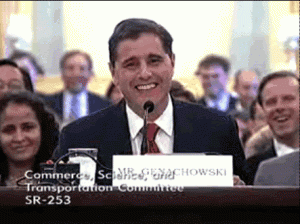I am listening to San Francisco’s hip hop station KMEL stream the suddenly dead Michael Jackson’s opus, and reading press releases hailing the full Senate confirmation of Julius Genachowski – he soon to be chair of the Federal Communications Commission.
“I look forward to working with Julius,” declared interim Chair Michael Copps this evening, “and all my colleagues at the Commission in tenacious pursuit of a communications policy that truly puts the public interest first.”
There are still two more FCC nominations that await Senate approval, one for South Carolina Public Service Commissioner Mignon Clyburn (she daughter of prominent Democrat James Clyburn) and another for former National Telecommunications and Information Administration biggie Meredith Attwell Baker. With their approval, the Obama administration will have a full Commission.
None of these new people have any substantial experience with radio. Genachowski is a new media guy. Clyburn, like most state public utilities folk, is most familiar with wireline regulation, and may be the least prepared of the new crop for her new job. Republican Baker’s focus at the NTIA was with the DTV transition, spectrum grants, and Internet domain issues. Incumbents McDowell and Michael Copps have their opinions about radio, but neither has any real affinity for the medium. McDowell was a telecom lobbyist prior to his coming to the FCC.
And my guess is that they won’t pay much attention to radio. It’s all going to be about broadband, wireless, spectrum allocations, white space, wireless issues like openness and exclusive handset deals, and, of course, the future of network management. All crucial issues, but so is radio.
Radio, real radio, the kind that is live and local and accessible, is in huge trouble. On the commercial end, its revenues have dramatically declined, as has its audience. On the non-commercial platform, the listeners are, well, old and getting older. Predictions of satellite radio’s demise appear daily. HD Radio is in a state of suspended animation. Podcasting is treading water. College radio stations are being mugged by budget crazed administrators.

KMEL, the "people's" radio station
And much of what passes for “radio” on the Internet is, in fact, not really radio. It’s juke box. Example: the online station I’m listening to while writing this post. It’s been almost three hours since Jackson’s death was confirmed, and I’m still waiting for KMEL to have someone on from the San Francisco Bay Area to talk about him. Or even to take a call or two from listeners. Nah. It’s just a stream of Jackson tunes, with the deejay making a two second comment every twenty minutes or so.
Why should anyone listen to KMEL when they can get the same format on Pandora or radio365? If KMEL is the “People’s radio station,” where are the people?
We need real radio. Radio that informs us and brings our voices together in times of crisis. Radio that lets us know what’s going on in our neighborhoods, in our cities, in our regions. Radio that gives our local musicians a first chance. Radio that, when it talks, talks with us, not just at us.
So what is the current FCC agenda? Not much, but a start.
Localism. The FCC still needs to resolve a wide variety of issues contained in its localism proceeding. Should the agency require a baseline amount of local programming from radio stations? Critics argue that this would burden already struggling broadcasters. But it may be that by abandoning any real local presence, over-the-air radio stations have walked away from the one unique service that they can offer in the hyper-competitive world of Web 2.0.
There are some complex and thorny issues to address in that docket. Should the agency require a 24 hour personnel presence at radio stations? Should it require all licenses to set up advisory boards? And if so, how? I’m not sure I have the answer to these questions, but since the agency has formally raised them, it should resolve them one way or the other.
Low Power FM. The FCC needs to continue to push Congress to pass Mike Doyle and Lee Terry’s Local Community Radio Act, which would make it much easier for the agency to license 100 watt non-commercial stations in urban areas.
Non-commercial, educational licenses. What’s going with all those license applications that the agency took last year for NCE stations? How many licenses have been awarded? How many have yet to be resolved? Progress report? Hello?
Sirius XM. Lots of loose ends are still hanging around the Sirius XM merger. Those minority channels need to be allocated. The FCC needs to decide whether to require interoperable receivers to pick up HD signals (they shouldn’t). And that long battle between Sirius XM and wireless carriers over potential WCS interference needs to be put to bed once and for all.
AM stations using FM translators. The FCC has been putting off a decision about this issue for years. Basically the problem is that AM stations have to reduce wattage at night when their signals become much more powerful. The agency needs to let smaller, struggling AM license holders access FM translators, so that they can provide more local service in the evening and early AM, but in a way that doesn’t encroach on LPFM.
What the FCC has yet to do is to establish an agenda for radio, to define what it really is, and chart out ways to further the medium. My biggest problem with the war over the Performance Rights Act is that it has allowed the National Association of Broadcasters stations to pose as martyrs and set the agenda. Saving “local radio” has been reduced to stopping the PRA.
Will the Genachowski FCC reach past the false dichotomy of “old media” versus “new media” and see what a crucial role real radio can play? Here at Radio Survivor we’ll be watching, and listening.



